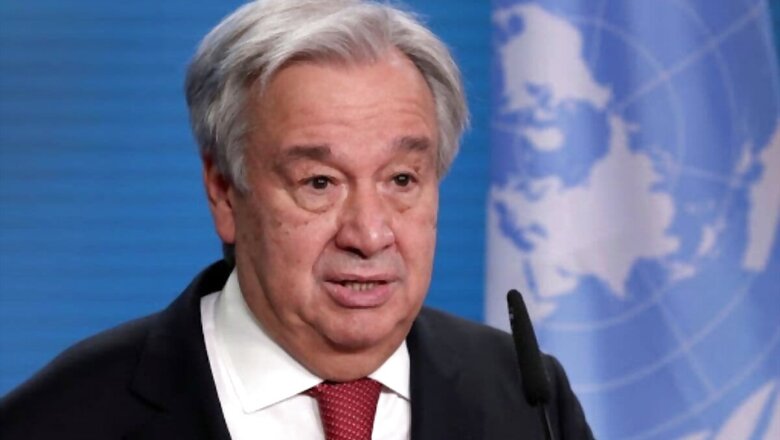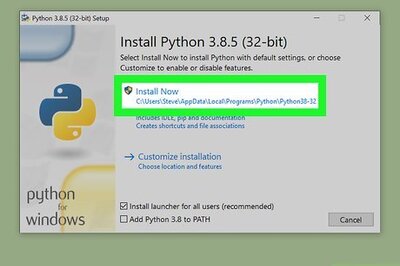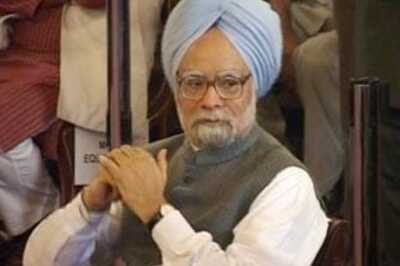
views
United Nations Secretary-General Antonio Guterres was appointed for a second-five year-term on Friday by the 193-member U.N. General Assembly.
“I will give it my all to ensure the blossoming of trust between and among nations large and small, to build bridges, and to engage relentlessly in confidence building,” Guterres told the General Assembly after taking the oath of office.
The 15-member Security Council earlier this month recommended the General Assembly re-appoint Guterres. His second term starts on beginning on Jan. 1, 2022.
Here is all you need to know about the leader:
Guterres, 72, was prime minister of Portugal from 1995 to 2002 and head of the U.N. refugee agency from 2005 to 2015. As secretary-general, he has been a cheerleader for climate action, COVID-19 vaccines for all and digital cooperation.
When He Took Over as UN Chief
• When he took the reins as U.N. chief, the world body was struggling to end wars and deal with humanitarian crises in Syria and Yemen. Those conflicts are still unresolved, and Guterres is also now faced with emergencies in Myanmar and the Tigray region of Ethiopia.
• Guterres succeeded Ban Ki-moon in January 2017, just weeks before Donald Trump became U.S. president. Much of Guterres’ first term was focused on placating Trump, who questioned the value of the United Nations and multilateralism.
• The United States is the largest U.N. financial contributor, responsible for 22% of the regular budget and around a quarter of the peacekeeping budget. President Joe Biden, who took office in January, has started restoring funding cuts made by Trump to U.N. agencies and re-engaged with the world body.
Career
• Prior to his appointment as Secretary-General, he served as United Nations High Commissioner for Refugees from June 2005 to December 2015.
• Before joining the UNHCR, Guterres spent more than 20 years in government and public service. He served as prime minister of Portugal from 1995 to 2002, during which time he was heavily involved in the international effort to resolve the crisis in East Timor, the United Nations states.
• He led the adoption of the Lisbon Agenda for Growth and Jobs as President of the European Council in early 2000, and co-chaired the first European Union-Africa conference. From 1991 to 2002, he served on the Portuguese Council of State.
• In 1976, Guterres was elected to the Portuguese Parliament, where he served for 17 years. He chaired the Parliamentary Committee on Economy, Finance, and Planning during that time, as well as the Parliamentary Committee on Territorial Administration, Municipalities, and the Environment. He also served as the chairman of his party’s parliamentary group.
• Guterres was a member of the Council of Europe’s Parliamentary Assembly from 1981 to 1983, when he chaired the Committee on Demography, Migration, and Refugees.
• Guterres was a long-time member of the Socialist International, a global association of socialist political parties. From 1992 until 1999, he served as the group’s vice president, co-chairing the African Committee and afterwards the Development Committee. From 1999 to mid-2005, he served as President. In the early 1970s, he also formed the Portuguese Refugee Council and the Portuguese Consumers Association DECO, as well as serving as president of the Centro de Acço Social Universitário, an organisation that carried out social development initiatives in underprivileged Lisbon neighbourhoods.
Personal Life and Education
• Guterres was born in Lisbon in 1949 and received his engineering degree from the Instituto Superior Técnico. He speaks Portuguese, English, French, and Spanish fluently. He has two children, a stepson, and three grandkids with Catarina de Almeida Vaz Pinto, Lisbon’s Deputy Mayor for Culture.
Read all the Latest News, Breaking News and Coronavirus News here.



















Comments
0 comment